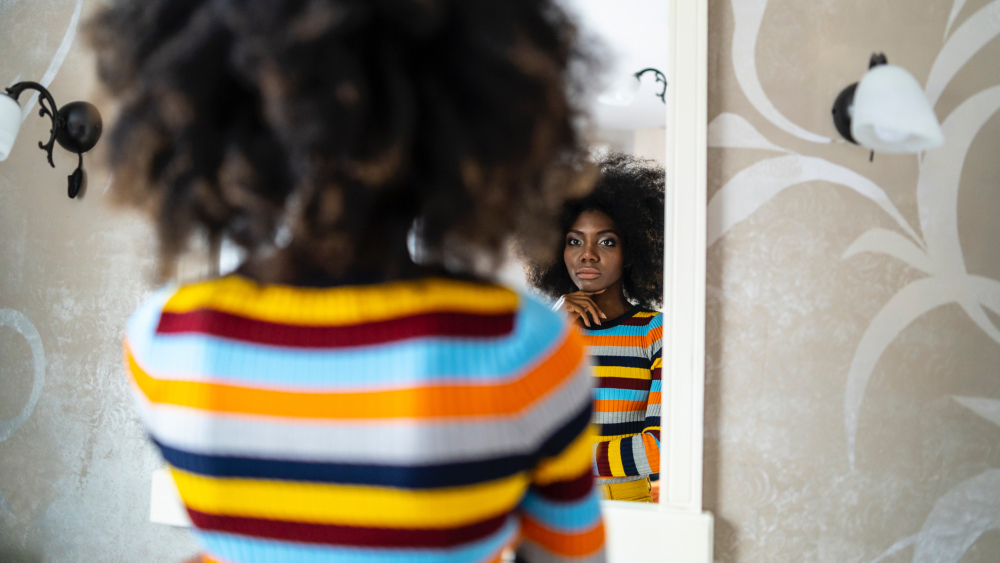If you’re interested in sharing your opinion on any cultural, political or personal topic, create an account here and check out our how-to post to learn more.
____
“If he picks up the cane from Harvard, that means he’ll go there. If he picks up the speaker, it means he’ll be a DJ.”
Recently, I celebrated my godson’s first birthday party via Zoom. The ceremony involved a beautiful Romanian tradition: items representing possible career paths and life experiences are placed on the floor, and the first item the baby chooses is said to indicate his future. Though playful, the gesture symbolizes the hopes we all have for our children’s lives.
What strikes me most is the ease and confidence in the way my white friends think about their children’s future lives and potential. As a Black woman, the wishes I have for my future children stand in stark contrast to the ones I have for my white godson.
It’s different for Black parents. Instead of worrying about whether our sons and daughters will get into Ivy League colleges, we have to worry about whether our children will even survive the brutality that comes with racism in America. An act as ordinary as going for a run becomes a life-threatening risk.
As Black people, we worry about making sure our children don’t become victims like Treyvon Martin and Ahmaud Arbery. In my own life, I hate to admit there have been times when I’ve wondered whether race is more important than love when considering a partner. “If my child is fully Black, they may face more racial profiling than if they were biracial and looked racially ambiguous — less likely to be shot and killed.”
For the past year, I’ve resorted to Googling “safe places in the world for Black people” because I’m scared for my life. I can’t imagine that my non-Black people of color counterparts are having these same conversations with themselves.
The term “people of color” (POC) is used to describe Blacks, Asians, LatinX and anyone else who is non-white. The issue arises when we use the term people of color to describe Black people. I often wonder why we do it. For non-Blacks, perhaps it’s because they don’t know when to refer to someone as Black versus African American. It could also be that those who aren’t Black feel uncomfortable using the term, in the same way I feel more comfortable saying “my friend is Jewish” than I do saying “my friend is a Jew.” The latter has historically carried a negative connotation. Nazis used the term “Jew” the same way white supremacists have referred to someone like me as Black, or worse terms.
During his time in office, I watched President Obama revert to the phrase, “person of color.” I began to realize that Black people use it as a tactic to include non-whites in our fight and to seem less threatening to white people. The #BlackLivesMatter movement experienced blowback when people argued that “all lives matter.” Fearing retaliation in the midst of a movement in which we need as many allies as possible, Black people walk on eggshells to appease their counterparts. I’m guilty of the same thing when speaking to white friends I fear will dismiss me with the argument, “But Obama is Black and he was president for two terms.” I catch myself worrying that talking about racism will make me seem like an “angry Black woman.” I skirt around my blackness for fear of making others uncomfortable.
Solidarity among all people of color is critical in transforming America from a country tainted by racism and xenophobia to one that embraces diversity. There’s a place and time for solidarity. It should happen after each individual is acknowledged for his or her experience. When Black people and our issues are lumped in with those of all people of color, our unique stories are lost. It perpetuates racism and allows for more cases like Ahmaud Arbery’s and George Floyd’s. True, brown people are also murdered senselessly at the hands of police and citizens, but for every Bijan Ghaiser case, more than a dozen Black lives are lost due to gun violence or law enforcement linked to racism. Sadly, Black people are murdered at a much higher rate.
Recently, an Asian-American acquaintance, horrified by the racism American Asians are facing as a result of coronavirus, reached out to ask me to design diversity training for her organization. “Asians are being threatened and called names because people are blaming them for bringing coronavirus to the United States,” she told me. I waited, hoping she would say something more.
I hoped she would say, “Martine, I know you understand this. As a Black person, you must have experienced the same suffering, directly and indirectly, throughout your life.” That’s the acknowledgement I hope to hear on this journey toward real solidarity among people of color.
Despite the Civil Rights Movement, the election of a Black president, and the success of Black influencers like Oprah and Beyoncé, Black people still face covert and overt racism. That admission shouldn’t negate the fact that other people of color also experience discrimination. Too many innocent Black lives have been taken, and we need the rest of the country to acknowledge that this is because of racism. We need to admit it rather than deny, or worse, justify it.
I’ve been stateless. I’ve been an undocumented immigrant. And I spent seven years in deportation proceedings, which I recount in my book, Illegal Among Us. I fought a long battle to become a member of a country I no longer feel safe in. Now I’m asking for allies. I’m asking for acknowledgment. I’m asking for people to admit that Black lives matter, too.
Only when this happens will Black mothers and fathers have the luxury of worrying whether their children will go to Harvard.
